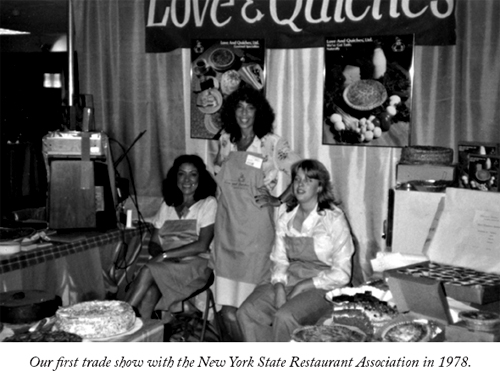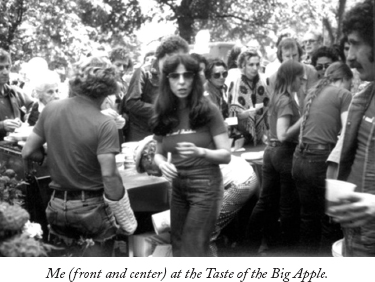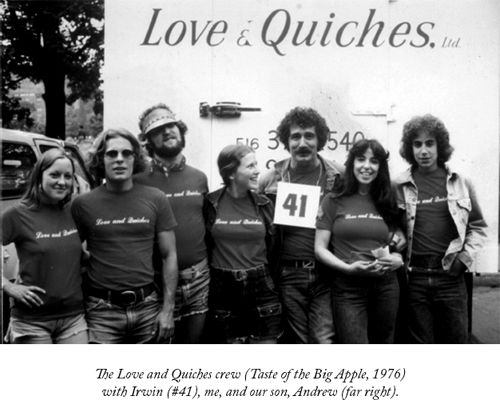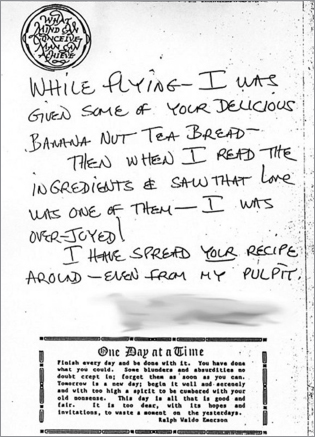With Love and Quiches (10 page)
Read With Love and Quiches Online
Authors: Susan Axelrod

The original founder of Food Gems, a quiche company that has gone through ownership and name changes, used to actually follow our trucks. He would wait outside while our driver made the delivery, and then he would wave to the driver and laugh as he headed inside with a sample in his hand. This went on for quite a while. Needless to say, our drivers weren’t too happy about this and explained to him
exactly what they were likely to do if he didn’t stop following them. We received a letter shortly thereafter accusing us of “hooliganism” of all things! Nothing ever came of it; he finally stopped because our drivers were big guys, and I guess he weighed the risk/reward factor.
Competition from other dessert companies located all over the country also grew and kept us on our toes. This never changed, and the battle continues. It took a while, but I eventually learned from all of this that there is enough business to go around if you stay calm and focus on what you do best.
Deep down in my heart of hearts, this will always be a New York story, even though for most of its life Love and Quiches has been a national, and, ultimately, a global supplier of bakery products. After all, we honed our skills supplying quiches and desserts to many hundreds of foodservice establishments in the New York metro area.
At this juncture, we also joined a few industry organizations, including the New York State Restaurant Association and the Eastern Dairy Deli Association. Joining the former brought us quite a few steps ahead because I showed up at
all
of the meetings, even board meetings. (I wasn’t on the board; I simply didn’t know any better.) Even after I realized my mistake, they asked me to stay. As a result, I met many more restaurateurs, among them Vincent Sardi of the iconic Sardi’s, so well known for its star power if not for its food, and Stuart Levin, who owned Top of the Park atop the Gulf and Western Building, which is now the Trump International Hotel on Columbus Circle and houses my favorite haute cuisine restaurant, Jean Georges. Stuart Levin became another close friend and mentor. Love and Quiches also exhibited for the first time in the New York State Restaurant Show in 1978. We were slowly making a name for ourselves with the New York power players within the foodservice industry.

One such player was the owner of Proof of the Pudding, which closed its doors owing me $700. About that same time he opened the very exclusive Palace restaurant in an exclusive apartment building on 59th Street overlooking the East River. There, well ahead of his time, he invented the hundreds-of-dollars-per-person dinner. He honored his debt to me with a due bill to the Palace, and Irwin and I enjoyed a spectacular meal on the house!
My best New York story is the “Taste of the Big Apple,” a major event held in Central Park in 1976 that was organized as a fundraising event by the New York State Restaurant Association. Nearly a hundred restaurants and suppliers set up booths, and, incredibly, hundreds of thousands of people showed up, many more than we had bargained for. The association sold script at the event entrance, with 25 percent of the revenue promised back to the vendors so we could cover our costs. We were to hand in our collected script at the end of the day.
We sold about five thousand slices of quiche before we ran out, and then we started selling our decorations: fruit, hunks of cheese, chopped chocolate, hard-boiled eggs, bowls filled with nuts, rolling pins, whisks, and the like, until our booth was completely denuded.
The association had run out of script, yet one lady insisted that we sell her our very last apple for cash. We told her we absolutely could not; it was against the rules. Suddenly she hit Irwin on the head with her pocketbook, grabbed the apple, and ran! Although we were all really tired and out of patience, we chased her and took back the apple just on principle.

Molly Ivins, a prominent columnist and
New York Times
bureau chief at the time, wrote up the successful event, and to our surprise, we were mentioned among very good company. Love and Quiches was even singled out ahead of quite a few other popular venues, including Sardi’s, the Grand Central Oyster Bar, and Benihana. And we all made a mess of the park. Though hundreds of Hare Krishna volunteers had it cleaned by the very next morning, the city would never allow us to hold another festival.
Within the next year or so, as we continued along our journey, new areas of growth presented themselves. I was knocking on doors
everywhere
and not confining my efforts just to restaurants. I went to hospitals, universities, caterers, gourmet shops, and corporate feeders—the people who fed the employees within the gigantic skyscrapers. I even went to the UN, where I just called for an appointment and handled it no differently than I would a pub on Third Avenue, except for
the intense security checks required just to enter the building, which included opening every sample cake box. (They eventually recognized me and would let me walk right in.) The UN had a lot of dining venues and did a lot of catering, as you can well imagine. They turned out to be a very good customer, both for our quiches and our desserts. I was never shy to knock on any door that was in my path, though it took a while to learn how to gear my sales pitch to the venue I was targeting.

One of our biggest and most exciting areas of Love and Quiches’ growth was in the airline industry. JFK was on my route to and from Manhattan, and one day I decided to go in and knock on some doors. All those passengers had to eat—why not our quiches and desserts? I made my way to the hangars on the periphery of the airport and
spotted a Marriott sign on one of the doors. Marriott used to be an in-flight food caterer that prepared meals to be served on planes, along with all the other things for which they are now known. They provided this service at La Guardia and Newark airports as well. At the time, airline catering was Marriott’s largest division, with facilities across the country. Once again, I made a sale. My original buyer at that facility, now an old friend, thinks that Marriott had actually started buying from us in a small way while Bonne Femme was still in my garage, but
I
think that story is apocryphal!
This was the beginning of a new area of growth for the company, and we continue to supply many major domestic and international airlines with our products. Now the strength of the entire organization is behind such sales, but back then it was limited to those airports that we could get to with our own trucks.
One airline we started selling to was People Express, a start-up that originated the first New York–to-Boston or -Washington shuttle. We sold them our first single-portion individually wrapped products, as a matter of fact. The products were fruit and veggie loaves, and included such varieties as Zucchini Bread, Banana Bread, and Carrot Bread, all of which we sliced and wrapped in cellophane. True to form, we did not yet possess the equipment to do this when we first made the sale—yet another example of the cart before the horse—but we fixed that situation pretty quickly. We had to; our first orders were already in-house! All we needed was a bread slicer and a small wrapping machine, readily available with so many equipment suppliers in our area. We went on to supply the various New York/Boston/Washington shuttles with these prewrapped slices for very many years, until they stopped giving them away to the passengers.
In those days we supplied many airlines that no longer exist—Eastern Airlines, Ozark Airlines, Pan American, and Braniff among them. The executive chefs of these airlines were extremely sophisticated, having worked in the best restaurants and hotels worldwide. (Two of these chefs became my mentors as well.) Within a year
of entering the airline sector, we had our first airline distributor—a special breed that exclusively supplied airline-catering kitchens nationwide—to distribute our People Express products to Washington and Boston so that they would be available on the return flights to New York. This opened the possibility of expanding our airline customers across the country.
Best of all, passengers on these various flights seemed to love our product. At one point, Swiss Air accused us of using sugar in our quiche crust without listing it on the label, citing the fact that it tasted too good. It took some work to convince them otherwise. We have an entire archive of airline fan mail that we’ve collected over the decades, and these letters, many of them handwritten (this was pre-Internet, remember), never cease to bring a smile to my face.


By 1978 we had grown to more than $1 million in volume.
*
We were now servicing about 275 restaurants, and I finally got my first help with sales, a tennis friend, Elaine, from the days when I still had time for tennis.
Our new freezer trucks were a good source of advertising for us because they were all over the place all week long; plenty of restaurants called us after noticing them while our drivers were making deliveries. Once, by sheer serendipity, we made the cover of one of the trade magazines (see photo). We kept our drivers even busier once Elaine started working—first two days a week, then three, then full time. She scanned the trade and local papers for leads, made cold calls on the phone, fed me leads, and also went out on sales calls.
